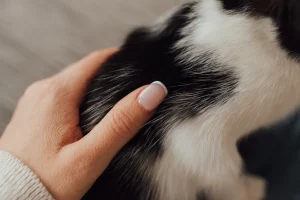Have you ever wondered why cat fleas sometimes choose to bite humans? Let’s explore the reasons behind this common occurrence.
Cat fleas often bite humans when their preferred animal hosts are not available. These tiny parasites can infest homes and can jump on humans for a blood meal. But why do cat fleas bite humans specifically? Let’s find out.
Understanding Cat Fleas and Their Behavior
Cat fleas, scientifically known as Ctenocephalides felis, are pesky little critters that feed on the blood of their hosts. These tiny insects are equipped with specialized mouthparts that are perfect for piercing the skin and sucking blood, making them efficient little vampires. While their primary hosts are cats, they are not picky eaters and will gladly latch onto humans for a meal.
These fleas are agile creatures, capable of jumping long distances to move between hosts. They are also skilled at hiding in the fur of animals or in the cracks and crevices of homes. Their ability to reproduce rapidly ensures that they can quickly establish a population in a new environment.
Understanding the biology and behavior of cat fleas is crucial to comprehending why they might bite humans. The need for a blood meal to survive drives these fleas to seek out any warm-blooded creature, including humans, as an alternative food source.
Factors That Attract Cat Fleas to Humans
While cat fleas prefer feline hosts, several factors can make humans appealing to these bloodthirsty pests. Body heat and carbon dioxide, which are emitted by all warm-blooded animals, act as attractants for fleas. Additionally, carbon dioxide tends to be higher in individuals who are active or have a higher metabolic rate, making them more attractive to fleas.
Furthermore, fleas are drawn to movement and vibrations, making individuals who are active or moving around more susceptible to flea bites. This is why you might notice more flea bites after engaging in physical activities or spending time in areas where fleas are present.
In addition to physical factors, fleas are also attracted to certain odors, such as sweat and body odor. Poor hygiene or sweaty clothing can make humans more appealing to fleas. Fleas may also be attracted to certain chemicals found in perfumes or skincare products, so be mindful of the scents you use if you want to avoid attracting these pesky parasites.
To prevent flea bites, it’s essential to address these factors that make humans attractive to cat fleas. Taking steps to reduce body heat, carbon dioxide emissions, and odors can help minimize the risk of attracting these unwanted guests.
The Risks of Cat Flea Bites for Humans
Cat flea bites on humans can be more than just annoying – they can also pose health risks. These pesky creatures can transmit diseases such as murine typhus and cat scratch fever. Additionally, some people may experience allergic reactions to flea saliva, resulting in itching, redness, and even swelling around the bite area. It’s essential to be proactive in preventing these bites to avoid potential health complications.
How to Prevent Cat Fleas from Biting Humans
Keeping your home clean and your pets treated is key to preventing cat fleas from biting humans. Regularly vacuuming carpets, washing pet bedding, and grooming your pets can help reduce the flea population in your home. Use flea prevention products recommended by your veterinarian to ensure your furry friends stay flea-free. Additionally, consider using natural remedies like diatomaceous earth or essential oils to repel fleas. Remember, prevention is the best defense against these tiny pests!
- Seal entry points: Keep windows and doors sealed tightly to prevent fleas from entering your home.
- Frequent bathing: Regularly bathe and groom your pets to remove any fleas and prevent infestations.
- Outdoor maintenance: Keep your yard well-maintained to reduce flea habitats and prevent them from entering your home.
- Consult a professional: If you’re dealing with a severe infestation, don’t hesitate to seek help from a pest control expert.
Remember, a proactive approach to flea prevention is the key to keeping both your pets and your family safe and comfortable.
Treatment Options for Cat Flea Bites on Humans
So, you’ve been unlucky enough to get bitten by those pesky cat fleas. Don’t worry, we’ve got your back with some effective treatment options:
- Clean the Bite Area: Start by washing the affected area with soap and water to prevent any infection.
- Applying Ice: An ice pack can help reduce itching and swelling caused by the flea bite.
- Use Over-the-Counter Creams: Hydrocortisone creams or calamine lotion can provide relief from itching.
- Take Antihistamines: If the itching is unbearable, consider taking antihistamines to alleviate the symptoms.
For severe reactions or if the bites become infected, it’s best to seek medical attention. Remember, prevention is key, so make sure to eliminate the fleas from your pets and living spaces to avoid future bites.
And for those moments when you need extra guidance, consult a healthcare professional for personalized advice. Stay calm, the itching will pass!
Interesting Facts About Cat Fleas
Did you know that cat fleas are not picky eaters when it comes to biting humans? But have you ever wondered why these tiny creatures choose to munch on us? Well, it all boils down to their need for blood to survive and reproduce. Cat fleas see humans as a readily available food source, especially when their primary host, our furry friends, isn’t around.
Additionally, cat fleas have incredible jumping abilities, allowing them to move between hosts with ease. These resilient pests can be quite a nuisance, but with proper treatment and prevention, you can keep them at bay.
Remember, knowledge is power when dealing with cat fleas. Stay informed, stay vigilant, and keep those pesky biters in check.
Natural Remedies to Repel Cat Fleas
Cat fleas can be a nuisance not only to your pets but also to humans. These pesky insects can bite humans, causing itchiness and discomfort. To repel cat fleas naturally, consider using essential oils such as lavender or cedarwood. These oils have repellent properties that can help keep cat fleas at bay. Another effective natural remedy is diatomaceous earth, which can be sprinkled around your home to kill fleas and their larvae.
In addition, maintaining a clean living environment is essential in preventing cat fleas from biting humans. Regularly vacuuming, washing pet bedding, and grooming your pets can help reduce the presence of fleas in your home. You can also try using herbal flea collars or citrus-based sprays to repel fleas from your pets.
Remember, prevention is key when it comes to dealing with cat fleas. By incorporating these natural remedies into your routine, you can help protect both your pets and yourself from flea bites.
The Connection Between Cat Fleas and Pet Health
Cat fleas not only pose a threat to humans but can also have serious implications for the health of your pets. When left untreated, flea infestations can lead to various health issues such as skin irritation, hair loss, and even anemia in severe cases.
To ensure the well-being of your furry friends, it’s crucial to regularly check for fleas and administer flea prevention treatments as recommended by your veterinarian. By staying proactive in your approach to flea control, you can help safeguard your pets from the potential risks associated with cat fleas.
Furthermore, the presence of cat fleas can create a cycle of infestation, where fleas from your pets can bite humans and vice versa. This interconnectedness underscores the importance of comprehensive flea control measures to protect both your pets and your family from these troublesome insects.
Remember, a healthy pet is a happy pet. Stay informed and proactive in managing cat flea infestations to promote the well-being of your beloved furry companions.
The Environmental Impact of Cat Fleas
Cat fleas can pose a significant environmental impact, not only affecting our furry friends but also posing a nuisance to humans. These pesky parasites thrive in warm and humid conditions, making our homes an ideal breeding ground for them. When cat fleas infest our pets and surroundings, they can quickly multiply and spread, causing discomfort and potential health risks. Additionally, cat fleas can carry diseases and transmit them to both animals and humans, further highlighting the importance of effective flea control.
One additional unique insight into the environmental impact of cat fleas is their role in disrupting ecosystems. Cat fleas can parasitize wildlife, such as rodents and birds, leading to population declines and imbalances in natural habitats. By controlling cat flea infestations in our homes, we can help prevent the spread of these parasites to other species and promote a healthier ecosystem.
Tips for Effective Flea Control in Your Home
- Regular Vacuuming: Vacuuming your carpets, furniture, and pet bedding regularly can help eliminate flea eggs, larvae, and adults from your home.
- Wash Bedding and Linens: Frequently wash your pet’s bedding, your bedding, and any linens they come into contact with to prevent flea infestations.
- Use Flea Treatments: Consult with your veterinarian to choose the right flea treatment for your pets, such as spot-on treatments or oral medications.
- Maintain Yard Hygiene: Keep your yard clean and well-maintained to reduce the likelihood of flea infestations outdoors.
- Natural Remedies: Consider using natural flea control methods like diatomaceous earth or essential oils to repel fleas.
By following these tips and implementing a comprehensive flea control plan, you can effectively prevent cat fleas from biting humans and keep your home flea-free. Remember, consistency is key in maintaining a healthy environment for both you and your pets.
The Myth of Cat Fleas Exclusively Targeting Cats
Forget the misconception that cat fleas only have eyes for felines! These pesky critters are equal-opportunity biters, and yes, that includes humans. So why do cat fleas sink their tiny teeth into us? Well, when our furry friends are unavailable, hungry fleas have no qualms about seeking out a warm-blooded meal elsewhere. Our pets’ absence doesn’t deter these opportunistic pests; they’ll gladly munch on any warm body they come across, including yours truly.
Debunking the myth of cat fleas exclusively targeting cats and exploring why they may also bite humans
Let’s set the record straight: cat fleas don’t discriminate based on species. While they may have a preference for our beloved pets, they won’t hesitate to feast on humans when given the chance. So why do these blood-sucking bugs turn to us for a snack? It all boils down to survival instincts. When cats aren’t around, fleas are resourceful enough to turn to other warm-blooded hosts, including humans, to satisfy their hunger. So, don’t be surprised if you find yourself on the receiving end of a flea bite – it’s just business as usual for these persistent parasites.
Reasons why cat fleas may also bite humans:
- Proximity: If you’re in close proximity to infested areas or pets, you may inadvertently become a target for hungry fleas.
- Temperature: Fleas are attracted to warm environments, and our body heat makes us an appealing host.
- Movement: Fleas are drawn to movement, making us easy targets when we’re on the move.
- Mistaken Identity: Sometimes, fleas mistake humans for their intended hosts, especially in the absence of pets.
So, next time you find yourself scratching those itchy red bites, remember that cat fleas aren’t picky eaters – they’ll gladly nibble on humans too!
Alex, a passionate animal lover, has experience in training and understanding animal behavior. As a proud pet parent to two dogs and three cats, he founded AnimalReport.net to share insights from animal experts and expand his knowledge of the animal kingdom.




